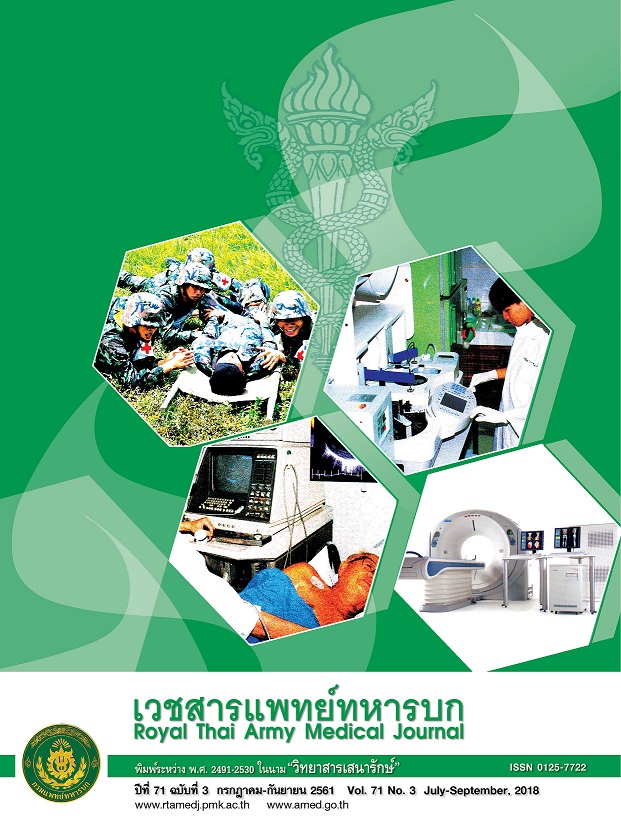Molecular Characterization of G6PD Gene Mutation in Neonatal Jaundice in Phramongkutklao Hospital
Main Article Content
Abstract
Introduction: A high prevalence of Glucose-6-phosphate dehydrogenase (G6PD) deficiency has been shown in Thailand. This disease can lead to acute hemolytic crisis, neonatal jaundice and kernicterus in some patients. Objective: To study the genotype of G6PD mutation in neonatal jaundice in Phramongkutklao Hospital. Methods: Study the genotype of 110 newborns who presented with neonatal jaundice from G6PD deficiency by High Resolution Melting (HRM) and direct DNA sequencing in Phramongkutklao Hospital. Result: Twelve G6PD variants have been identified. G6PD Viangchan (871 G>A)(0.390) was the most common identified mutation, followed by G6PD Canton (1376 G>T)(0.130) and G6PD Kaiping (1388 G>A)(0.103) respectively. Moreover, G6PD Valladolid (406 C>T) (0.014) and G6PD Aureus (143 T>C)(0.007) were identified for the first time in Thailand. Mean of microbilirubin was 12.53 ± 3.05 mg/dL and has no correlation with both gender and type of mutations. Conclusion: G6PD Viangchan (871 G>A), G6PD Canton (1376G>T) and G6PD Kaiping (1388 G>A) were the three most common mutations in our study. G6PD Viangchan (871 G>A) and G6PD Kaiping (1388 G>A) were classified into class II which can present acute hemolysis. So, the accurate and rapid testing can prevent and relieve the acute hemolysis in neonatal jaundice.
Article Details
References
Filosa S, Fico A, Paglialunga F, Balestrieri M, Crooke A, Verde P, et al. Failure to increase glucose consumption through the pentosephosphate
pathway results in the death of glucose-6-phosphate dehydrogenase gene-deleted mouse embryonic stem cells subjected to oxidative stress. Biochem J. 2003;370(Pt 3):935-43.
Beutler E. Glucose-6-phosphate dehydrogenase deficiency: a historical perspective. Blood. 2008;111:16-24.
Hecker PA, Lionetti V, Ribeiro RF, Jr., Rastogi S, Brown BH, O’Connell KA, et al. Glucose 6-phosphate dehydrogenase deficiency increases redox stress and moderately accelerates the development of heart failure. Circ Heart Fail. 2013;6:118-26.
Luzzatto L, Seneca E. G6PD deficiency: a classic example of pharmacogenetics with on-going clinical implications. Br J Haematol. 2014;164:469-80.
Tanphaichitr VS, Pung-amritt P, Yodthong S, Soongswang J, Mahasandana C, Suvatte V. Glucose-6-phosphate dehydrogenase deficiency in the newborn: its prevalence and relation to neonatal jaundice. Southeast Asian J Trop Med Public Health. 1995;26(Suppl 1):137-41.
Nuchprayoon I, Sanpavat S, Nuchprayoon S. Glucose-6-phosphate dehydrogenase (G6PD) mutations in Thailand: G6PD Viangchan (871G>A) is the most common deficiency variant in the Thai population. Hum Mutat. 2002;19:185.
Frank JE. Diagnosis and management of G6PD deficiency. Am Fam Physician. 2005;72:1277-82.
Travis SF, Kumar SP, Paez PC, Delivoria-Papadopoulos M. Red cell metabolic alterations in postnatal life in term infants: glycolytic enzymes and glucose-6-phosphate dehydrogenase. Pediatr Res. 1980;14:1349-52.
Mesner O, Hammerman C, Goldschmidt D, Rudensky B, Bader D, Kaplan M. Glucose-6-phosphate dehydrogenase activity in male premature and term neonates. Arch Dis Child Fetal Neonatal Ed. 2004;89:F555-7.
Charoenkwan P, Tantiprabha W, Sirichotiyakul S, Phusua A, Sanguansermsri T. Prevalence and molecular characterization of glucose-6-phosphate dehydrogenase deficiency in northern Thailand. Southeast Asian J Trop Med Public Health. 2014;45:187-93.
Ninokata A, Kimura R, Samakkarn U, Settheetham-Ishida W, Ishida T. Coexistence of five G6PD variants indicates ethnic complexity of Phuket islanders, Southern Thailand. J Hum Genet. 2006;51:424-8.
Bancone G, Chu CS, Somsakchaicharoen R, Chowwiwat N, Parker DM, Charunwatthana P, et al. Characterization of G6PD genotypes and phenotypes on the northwestern Thailand-Myanmar border. PLoS One. 2014;9:e116063.
Glomglao W, Chansing K, Treesucon A, Siraprapapat P, Thongnoppakhun W, Sanpakit K, et al. Direct detection for G6PD Bangkok and G6PD Bangkok Noi mutations in the families with chronic nonspherocytic hemolytic anemia (CNSHA). Int J Lab Hematol. 2015;37:e21-4.
Laosombat V, Sattayasevana B, Janejindamai W, Viprakasit V, Shirakawa T, Nishiyama K, et al. Molecular heterogeneity of glucose-6-phosphate dehydrogenase (G6PD) variants in the south of Thailand and identification of a novel variant (G6PD Songklanagarind). Blood Cells Mol Dis. 2005;34:191-6.
Huang CS, Hung KL, Huang MJ, Li YC, Lui H, Tang TK. Neonatal jaundice and molecular mutations in glucose-6-phosphate dehydrogenase deficient newborn infants. Am J Hematol. 1996;51:19-25.
Singhamatr P, Wanotayan R, Suwanjunee S, Phudharaksa T, Laibua B, Meekaewkuhchorn A. Biochemical and molecular analysis of glucose-6-phosphate dehydrogenase in red blood cells. Thai Pediatric J. 2009;16:157-65.
Bang-Ce Y, Hongqiong L, Zhensong L. Rapid detection of common Chinese glucose-6-phosphate dehydrogenase (G6PD) mutations by microarray-based assay. Am J Hematol. 2004;76:405-12.
Du CS, Ren X, Chen L, Jiang W, He Y, Yang M. Detection of the most common G6PD gene mutations in Chinese using amplification refractory mutation system. Hum Hered. 1999;49:133-8.
Meichen P, Min L, Lin Y, Jiaoren W, Xiaofen Z, Ying Z, et al. Glucose-6-phosphate dehydrogenase (G6PD) gene mutations detection by improved high-resolution DNA melting assay. Mol Biol Rep. 2013;40:3073-82.
Jing-bin Y, Hong-ping X, Can X, Zhao-rui R, Guo-li T, Fanyi Z, et al. Rapid and reliable detection of glucose-6-phosphate dehydrogenase (G6PD) gene mutations in Han Chinese using high-resolution melting analysis. J Mol Diagn. 2010;12:305-11.
Joly P, Lacan P, Garcia C, Martin C, Francina A. Rapid genotyping of two common G6PD variants, African (A-) and Mediterranean, by high-resolution melting analysis. Clin Biochem. 2010;43:193-7.
Minucci A, Moradkhani K, Hwang MJ, Zuppi C, Giardina B, Capoluongo E. Glucose-6-phosphate dehydrogenase (G6PD) mutations database: review of the “old” and update of the new mutations. Blood Cells Mol Dis. 2012;48:154-65.
Kaplan M, Hammerman C. Glucose-6-phosphate dehydrogenase deficiency: a potential source of severe neonatal hyperbilirubinemia and kenicterus. Seminars in Neonatology. 2002;7:121-8.
WHO Working Group. Glucose-6-phosphate dehydrogenase deficiency. Bulletin of the World Health Organization. 1989;67:601-11.
Memon N, Weinberger B, Hegyi T, Aleksunes LM. Inherited disorders of bilirubin clearance. Pediatr Res. 2016;79:378-86.
Agrawal SK, Kumar P, Rathi R, Sharma N, Das R, Prasad R, et al. UGT1A1 gene polymorphisms in North Indian neonates presenting with unconjugated hyperbilirubinemia. Pediatr Res. 2009;65:675-80.
Iranpour R, Akbar MR, Haghshenas I. Glucose-6-phosphate dehydrogenase deficiency in neonates. Indian J Pediatr. 2003;70:855-7.

